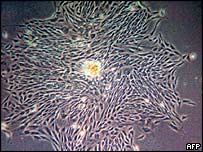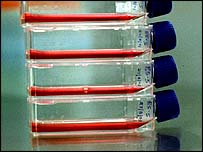President George Bush became the first president to complete four years in office without a veto since John Quincy Adams in the 1820s. He finally vetoed a controversial bill which would have lifted a ban on federal funding for new embryonic stem cell research.
The Islamic perspective on such a contemporary and controversial topic is not easy to discuss but I found some information from www.islamonline.net
Dr. Imran Siddiqi, a Ph.D. in Genetics, son of Dr Muzammil Siddique former head of the Islamic Society of North America (ISNA) poses the following questions.
Q1 ) Should an embryo, which is formed within a few days after an artificial fertilization and is not yet in the womb of its mother, be considered a human being, with all the rights of a human being?

According to the Shari’ah we should make a distinction between actual life and potential life. Also we should make a clear distinction between the fertilized ovum in the dish and the fertilized ovum in the womb of its mother. Indeed an embryo is valuable. It has the potential to grow into a human being, but it is not yet a human being. Similarly there is big difference in having something in a test tube or dish or something in the body of a human being. As mentioned above these embryos were developed initially in the laboratory solely for the sake of reproduction and, due to limitations of the in-vitro fertilization technique, they were produced in excess of what was required for this purpose. As a result, the remaining embryos would have either been frozen indefinitely or destroyed. If these embryos were treated as full human, it would have been forbidden to produce them in excess and to destroy them later. No one treats them as humans. Destroying such embryos is not called and cannot be called abortion. We disagree with the Catholic position that this is “equivalent to infanticide”. Muslim jurists have made a clear distinction between the early stages of pregnancy (first 40 days) and its later stages. It is mentioned that if someone attacks a pregnant woman and aborts her baby in the early stages of her pregnancy, that person’s punishment will be less than that of the person who does that during full pregnancy. And if he kills the child after the birth, then he is liable to be punished for homicide.
Q2 ) Is it acceptable by Shariah to destroy an embryo for the sake of research, even if this research can potentially cure many otherwise fatal diseases ?

Our answer is that the embryo in this stage is not human. It is not in its natural environment, the womb. If it is not placed in the womb it will not survive and it will not become a human being. So there is nothing wrong in doing this research, especially if this research has a potential to cure diseases. However, it is important that we establish strict rules against the misuse of embryos. Research on embryos has the potential for misuse, for instance in regards to the donors of these cells, and we should anticipate what these misuses might be and establish safeguards against them. For example, doctors might have infertility patient go through extra cycles of ovulation just so they can obtain more embryos or they might pay women to produce embryos or the embryos might be obtained without the consent of the donors. In making rules the authorities should also clarify that there is a difference between the use of “spare” embryos from in-vitro fertilization procedures which would be destroyed regardless, as compared to the deliberate production of embryos for stem cell research. Each year thousands of embryos are wasted in fertility clinics around the world. Such embryos should not be wasted, they should be used for research. It is also good to encourage the research on the alternative: to use adult stem cells instead of embryonic or fetal stem cells. This would be much less controversial. However, it seems from the discussion of the experts in the field that adult stem cells are not nearly as useful as embryonic stem cells in their ability to give rise to different cell types and would therefore not be as applicable in treating many diseases.
Dr Imran makes the following recommendations:
1. It is claimed by the experts in the field that the research on stem cells has great potential to relieve human disease and suffering. If this is the case then it is not only allowed but it is obligatory (fard kifayah) to pursue this research.
2. The use of embryonic stem cells should be very heavily limited, by confining it to the isolation of stem cells from frozen embryos that were created for the purpose of in-vitro fertilization and would otherwise have been destroyed. In addition, full consent must be obtained from the donors, and there must be safeguards against monetary compensation to embryo donors and against the creation of embryos in excess of what is required for in vitro fertilization.
3. Perhaps research using stem cells derived from adults will eventually prove to be most promising. We should encourage further research on the use of adult stem cells, to the point where it will be unnecessary to use embryos for this purpose. Specifically, we should find better ways to isolate existing stem cells in the human body.
I hope the above provides a stimulus for further discussion and investigation. Click here for the complete reading on Dr Imran's perspective.
Following also are usesful links on related topics:
IVF Using Donated Sperm
Artificial Insemination from an Islamic Perspective
Does Islam Allow “Surrogate Motherhood”?
Asak and thanks for this insightful post. i beleive the problem with todays youth be it Muslim or otherwise is that they don't have a stand on a lot of issues until they discover the facts themselves. They are more vulnerable to being mislead by an opposing and that can only be checked if we take up the challenge to inform them poractively. - Javed